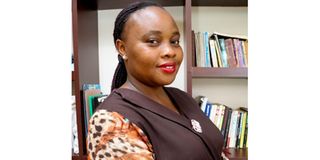Rose: Creating equal platforms for those differently abled girls

Rose Tesha. PHOTO | COURTESY
What you need to know:
- Having seen the stuggle the disabled community goes through, Rose is on a mission to create platforms
Dar es Salaam. Rose Tesha is the first female Country Director of the disability rights-based organization, Action on Disability and Development Tanzania (ADD) which fights for independence, equality, and opportunities for people with disabilities.
For the past five years, Rose has been providing leadership and strategic direction to the organization.
She has designed and rolled out key disability related research such as the voice of children with disabilities, improving livelihoods of persons with disabilities through economic empowerment and a disability and gender-based violence.
She led the Disability Inclusive Development Pre- Primary Inclusive Education model development and promoted a holistic and systemic delivery approach to inclusive education in Tanzania.
Commenting on the inclusive education she says, “Education in Tanzania is a right for all citizens. ADD promotes the holistic and systemic approach towards inclusive education by beleving that a child with disabilities, similar to any other child, has a right to education.
“By holistic we mean enhancing educational services for a child with disabilities or special needs by adopting an inclusive approach to policy-making and service delivery planning, ensuring teaching and learning are accessible to all, in particular by developing specific staff capabilities, providing pedagogical support, promoting community participation and ownership of education, as well as facilitating the use of sign language and Braille,” she says.
She says, it is important because only 4,178 children with disabilities were enrolled in pre-primary in the year 2020 compared to 1,377,409 who have none.
“Majority of them are left out of the education system. In primary 55,758 primary pupils of grade 1 to 7 were identified as having disabilities out of a primary population of almost 11 million (10,925,896),” she adds
Rose helps women and girls with disabilities to organize themselves by setting a national and district level platforms which proved to be an effective and sustainable mechanism for bringing change.
Dedicating her knowledge and skills to serve those who are not as previledged is a personal calling and she started serving the micro and small business men and women to support them to grow their business and entrepreriual skills.
“I later I moved to underserved regions where I offerred support to vulnerable groups to sustain their livelihood through family sponsoship, enterprise development, horticulture production and linking them to oil and gas companies as well as the toursist sector,” says Rose.
Her roles at ADD include leading and directing the work of ADD International in accordance with ADD International’s policies and accountability systems; ensuring that ADD International programmes are well designed and in line with our theory of change, strategic focus areas and value for money approach.
“Some of my key work includes peer led participatory research named the Voice of Children With Disabilities, improving livelihoods of persons with disabilities through economic empowerment and one on disability and gender-based violence,” says Tesha.
Commenting on the lessons she has learned and how they are shaping her career, Rose says she puts her values as a leader to task and asks herself “do you consider yourself a servant of those who look to you to guide their ways?” or “is it all about doing what you think is suitable for them rather than what they say suits them most?”
Mentioning the most pressing issues that need urgent response in resolving in connection to people living with disabilities and gender violence she says to first recognise and support the reality that women with disabilities have their own identity, needs and power to bring change.
“Face the truth that women and girls with disabilities often feel marginalized even in disability and women/gender-focused programmes, organisations and movements. Bring organisations of women with disabilities together to think and act as a movement and invest strongly in facilitating their mutual understanding and trust,” she says.
Being asked on what can be done to get more women with disabilities in leadership positions she says, women with disabilities have developed their own district level platforms of which they themselves organise, select their leaders based on their localities and the leadership skills the individual women demontrate.
In order to support women securing leadership positions, efforts should be made to ensure they are capacitated to build their confidence and self esteem, she says.
“In doing so, we support development of local structures and leaders everywhere with the confidence and networks to get rapidly and responsively into action. Relevant and effective engagement and impact will increase significantly,” says Rose.
Commenting on her leadership style she says, she practices both democratic and servant leadership styles. She sees herself as a person who utilizes diverse skills, qualities and knowledge of her team.
“I cultivate consensus and consistently ask for opinions and listen to people’s responses. Due to the nature of the group I lead, I see myself as their servant, using my leadership skills to serve and bring an everlasting and positive change in the lives of persons with disabilities. I am obliged to come up with ultimate solution which will bring the most impactful changes and touch the lives of those who have been left behind,” she says.





